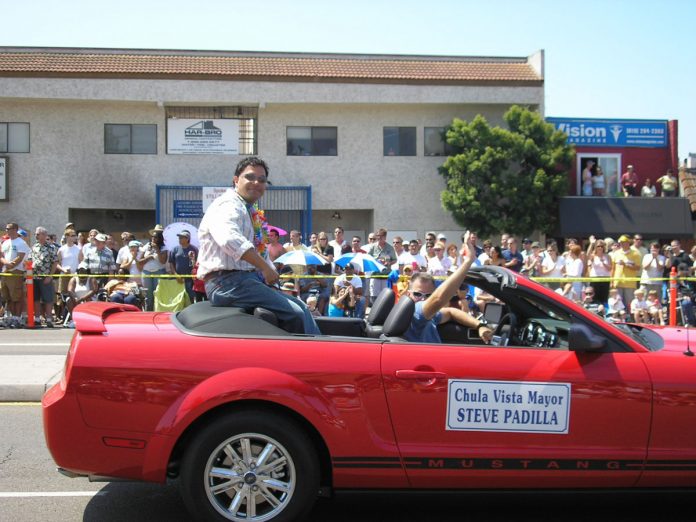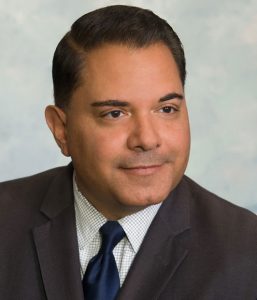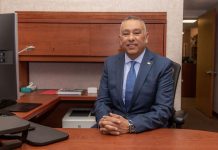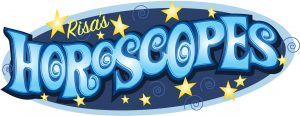
The date was July 29, 2005.
Then-Chula Vista Mayor Steve Padilla stood backstage at the annual Spirit of Stonewall Rally — an event that’s been held in San Diego since 1975 and meant to kick off a weekend of LGBT Pride festivities.
The rally, held at Balboa Park’s Marston Point, was packed with supporters — Padilla estimates that there must have been a couple thousand attendees— and the stage was lined with lesbian, gay, bi-sexual transgender legislators from up-and-down the California coast.
Toni Atkins, San Diego’s acting mayor — and first to ever be openly lesbian — was set to introduce Padilla, who was at the event to deliver a Chula Vista proclamation recognizing the LGBT community for the first time in his city’s history.
What people did not know, at least officially, was that Padilla himself identified as a gay.
Padilla had come out to his family six years earlier in 1999, during which time he separated from his wife and begin living as a gay man, but he had never made an official statement to the public about it.
Rumors, however, had swirled. A lifelong Chula Vista resident since the age of five, Padilla had served on the City Council from 1994-2002 and by the time he ran for mayor in 2002, his sexuality was more-or-less an open secret.
“I think the last remaining hurdle for me was when I was really ready to have a conversation with the press about it,” Padilla, now a Chula Vista council member overseeing District 3, says while sitting in his office at City Hall on a warm June afternoon.
“I still wanted to look at that as an element of my personal privacy, my private identity as opposed to my public life.”

So, when Padilla — in what he describes as a “spontaneous” decision — went over to Atkins and told her to introduce him as a member of the community, she asked if he was sure.
He was.
“I started thinking to myself, how can I go out there on that stage and give this (proclamation) as the mayor of Chula Vista, when a lot of the people, at least some of them, know that I am gay, how can I not acknowledge that in light of all this stuff that’s going on,” Padilla said. “I just couldn’t.”
It was, in fact, a trying time for the LGBT community, which was in the midst of a lengthy battle for marriage equality and whose pride theme that year was “Equal Rights! No more no less!”.
Five years earlier, the passing of Prop 22 ensured that same-sex marriage would remain invalid in the state, and, while the California senate voted to legalize same-sex marriage with the passing of Assembly Bill 19 in September of 2015, it was doomed to be vetoed later that month by then-governor Arnold Schwarzenegger.
So, Padilla spoke, and the crowd roared. Reporter’s cameras were shoved in his face as soon as he got off stage. He had simultaneously become the first openly gay mayor in the history of Chula Vista and of the second-biggest city in the county (behind only San Diego).
It all came as a surprise to Padilla, who said he was not aware he was about to make national news with his coming out. Also in for a surprise was his chief of staff and political consultants, who were not informed beforehand of his announcement and who had planned to roll out the news in a more meticulous manner.
“In the emotion of the moment that all went out the window,” Padilla said. “I was just spontaneous, I just embraced what I thought was right.”
Emails, calls and letters started pouring in from all around the country. Many were from LGBT students, young adults and teenagers expressing admiration for what he had done and how he’d inspired them.
At the same time, hate made an appearance. There was the anonymous phone calls and letters and threats. Padilla recalls a time at the grocery store, when a soccer mom gave him a dirty look and quickly ushered her kids away, as if he was a predator.
“It was the worst feeling in the world to feel that in your own community,” Padilla said.
On account of the threats, Padilla and the city took action, hiring the mayor his own personal bodyguard — which reportedly cost $10,000 a month — in order to keep him safe.
Many residents and some fellow city council members were not pleased. Padilla recalled being approached at the city’s annual Lemon Festival by an elderly man, who came and mumbled in his ear that he should be able to protect himself, that he should just get a gun, that he was not a real man.
Then, there was the time Padilla’s car was in the shop and he was being driven to work by his stepfather. They were listening to sports talk radio. The theme song from the movie The Bodyguard with Whitney Houston began to play. The hosts ridiculed Padilla, attacked his masculinity, insinuated he was having a sexual tryst with his bodyguard. His stepdad quickly flipped the station.
“I think today, looking back on that, I don’t think anybody would laugh at or make fun, or never mind make a political football out of the personal security of an elected official,” Padilla said.
Padilla ended up firing his bodyguard, David Kanter, only a few months later, in January of 2016.
The damage, however, was done, and a series of other controversies — involving things such as allowances, stipends and payroll advances — likely contributed to Padilla losing his mayoral seat to Cheryl Cox later that year.
Padilla was on the outs, and now, looking back, said he believes opening up about his sexuality was what put him there.
“What they really were voting against me for was, ‘How dare you come out and tell us that you’re gay as our mayor, how dare you embarrass our city like this, how dare you,’ and some people told me that,” Padilla said.
In fact, Padilla said if he had not opened up about his sexuality, he believes he likely would have not had his seat challenged at all.
“The fact is, if I wasn’t gay and I hadn’t come out in office, I probably would not have been challenged in the first place for re-election,” he said. “Certainly not by someone with a prominent last name who made a political calculation that the fact that I came out as gay offered a political opportunity.”
Supporters came up to Padilla after the election, telling him to get out of Chula Vista, that the city did not deserve him, to go someplace else where he would be accepted and appreciated.
For Padilla, however, leaving was not an option.
“I stayed in this community because I love this community, and because it’s as much my community as anybody else’s. I’ve given my whole life to try and help it realize its full potential, so I ain’t going anywhere,” Padilla said. “I’m not certainly going to let hatred drive me anywhere.”
Padilla stayed active in the community, even serving on the Board of Port Commissioners, a position he used to, among other things, continue his advocacy for progress on the city’s bayfront development plan.
Then, in 2014, Padilla threw his hat back into the political arena by making a run at a City Council seat, but ended up losing by only two votes to councilman John McCann.
Instead of the close loss devastating him, Padilla said, in his eyes, it brought him hope.
“After 2006, I thought people hated me, I thought I was all washed up, I thought there was no way I’d ever get elected to anything ever again,” he said. “The reality is, what that told me was there were a lot of people that still supported me in this town.”
Padilla tried his luck again in 2016, and received 2,000 votes more than his opponent, Jason Paguio. It had taken 10 years, but Padilla was back, and this time — with no open secrets — he became the first openly gay man elected in city history.
Padilla said that while the journey was hard, in the end, it only made him stronger.
“I had to come to grips with some things, but ultimately I would like to think it gave me wisdom and some clarity and made me, ultimately, a better person,” Padilla said. “Going through it at the time was no picnic.”
Growth has also occurred over the years in the city of Chula Vista’s attitude towards the LGBT community, with the city set to celebrate South Bay Pride for the 19th year on Sept. 14 at Bayside Park.
“To be engaging in discrimination in marginalizing people, in hating on people because of who they are at the core of the fiber of their being, is a threat to our social cohesion, it’s a threat to a lot of things,” Padilla said. “That’s why Pride is important, because Pride represents standing up and being free and open and dignified and celebrating that diversity among a community that’s been and continues to be marginalized.”
Padilla said he was brought to tears at last year’s South Bay Pride event, after the city hung a rainbow pride flag at City Hall.
“It just tells you that most people are basically good and that they desire to have a good connection to their fellow human beings, and that this community is good and open and that everyone evolves and that there’s hope,” he said.
As of today, there have been more than 60 openly gay and lesbian mayors in the United States, one of whom, Peter Buttigieg, is running for the United States presidency.
Padilla said that, as a gay politician, it is part of your duty to support your community.
“Those of us in the LGBT community have an obligation to be supportive of our community in so much as that we have an understanding of what it’s like for individuals to struggle and be sensitive to that,” he said.
In addition to overseeing District 3, Padilla is the vice chairman of the California Coastal Commission and is currently beginning the process of raising money for his 2020 city council reelection campaign.














